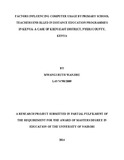| dc.description.abstract | The study aimed at establishing factors influencing computer usage by primary school teachers
enrolled in distance education programme. The study was guided by the following objectives: to
establish home computer availability among primary school teachers who have enrolled for
distance, to determine internet accessibility among primary school teachers who have enrolled
for distance education, to assess the competence of computer usage among primary school
teachers who have enrolled for distance and to establish whether there are gender differences in
computer usage among primary school teachers who have enrolled for distance. This study used
descriptive survey design. The target population are the primary school teachers in Kieni East
District who have enrolled in distance education programmes. The study used purposive
sampling to obtain the respondents. This study used questionnaire as the tool of data collection.
Descriptive and inferential statistics were used for data analysis. Research findings were
presented using tables. Regarding home computer availability, it was found out that substantial
number of distance learners have computers at home. However, there are more males with home
computers than females. In relation to access to internet, it was found that most distance learners
have access to internet. For those who can access internet, it is beneficial in their distance
learning since they can access a variety of content. However, there are more male distance
learners with access to internet than female distance learners. In relation to computer
competence, it was found that most distance learners have taken a course in computers.
However, most of them rate their competence in computers as average and low. In addition, male
distance learners have a higher tendency to use computers and are more interested in computers
and this makes them more competent than their counterpart female distance learners. In
connection to gender differences in computer competence, it was found that male distance
learners are more competent in computers than their female counterparts because they are more
interested and like using computers more hence improve on their competence. The study found a
significant relationship between computer competence and computer usage and between gender
differences and computer usage among distance learners. The researcher recommended that
distance educators should show the importance of computers to the distance learners. Female
distance learners should increase their interest and time in computer usage to improve
competence. The researcher suggested that a similar study should be carried out in other areas in
the country to establish whether the findings are similar to those generated by the study and
further research should carried out to establish how to overcome the gender differences in
computer usage among distance learners in Kenya. | en_US |



